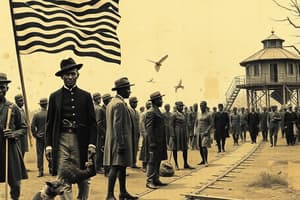Podcast
Questions and Answers
The Fugitive Slave Act of 1850 strengthened the enforcement measures of the 1793 version of the Fugitive Slave Act.
The Fugitive Slave Act of 1850 strengthened the enforcement measures of the 1793 version of the Fugitive Slave Act.
True (A)
States in the North were compelled to enforce the Fugitive Slave Act of 1793.
States in the North were compelled to enforce the Fugitive Slave Act of 1793.
False (B)
The Fugitive Slave Act of 1850 allowed individuals to aid escaping slaves without facing any penalty.
The Fugitive Slave Act of 1850 allowed individuals to aid escaping slaves without facing any penalty.
False (B)
Alleged fugitives were granted the right to defend their case with a jury trial according to the Fugitive Slave Act.
Alleged fugitives were granted the right to defend their case with a jury trial according to the Fugitive Slave Act.
Abolitionists in the North circumvented the Fugitive Slave Act through the operation of the Underground Railway.
Abolitionists in the North circumvented the Fugitive Slave Act through the operation of the Underground Railway.
The Fugitive Slave Act made federal agents responsible for arresting suspected runaway slaves.
The Fugitive Slave Act made federal agents responsible for arresting suspected runaway slaves.
Under the Fugitive Slave Act, federal agents were not entitled to a recovery fee for capturing suspected runaway slaves.
Under the Fugitive Slave Act, federal agents were not entitled to a recovery fee for capturing suspected runaway slaves.
Anthony Burns, a fugitive from Virginia, was able to secure his freedom after being returned to Virginia under the Fugitive Slave Act.
Anthony Burns, a fugitive from Virginia, was able to secure his freedom after being returned to Virginia under the Fugitive Slave Act.
Joshua Glover, a freedom-seeker, found asylum in Racine, Wisconsin, and was never tracked down by his owner.
Joshua Glover, a freedom-seeker, found asylum in Racine, Wisconsin, and was never tracked down by his owner.
Between 1850 and 1860, an estimated 15,000 to 20,000 African Americans settled in Canada to escape slavery.
Between 1850 and 1860, an estimated 15,000 to 20,000 African Americans settled in Canada to escape slavery.
The Act made more federal agents available for ______ enforcement
The Act made more federal agents available for ______ enforcement
To encourage agents to enforce the law, they were entitled to a recovery fee, influencing many to abduct, by any means, Black persons (free or otherwise) and sell them to ______ traders or slaveholders
To encourage agents to enforce the law, they were entitled to a recovery fee, influencing many to abduct, by any means, Black persons (free or otherwise) and sell them to ______ traders or slaveholders
Free Blacks were in jeopardy of being kidnapped and sold into slavery in the South without ______
Free Blacks were in jeopardy of being kidnapped and sold into slavery in the South without ______
Impact Based on available census figures and documented testimonies, historians have tried to calculate the number of African Americans who entered ______
Impact Based on available census figures and documented testimonies, historians have tried to calculate the number of African Americans who entered ______
Following his return to Virginia, he was sold to another slave holder in North ______
Following his return to Virginia, he was sold to another slave holder in North ______
The Fugitive Slave Act, first passed by the federal government 4 February 1793, gave slaveholders the right to recover escaped enslaved persons.While federal authorities could execute the Act, states were not compelled to enforce it.Many Northern states disregarded the law.Abolitionists in the North circumvented the law through the operation of the Underground ______.
The Fugitive Slave Act, first passed by the federal government 4 February 1793, gave slaveholders the right to recover escaped enslaved persons.While federal authorities could execute the Act, states were not compelled to enforce it.Many Northern states disregarded the law.Abolitionists in the North circumvented the law through the operation of the Underground ______.
Some states implemented Personal Liberty Laws to hamper enforcement and gave fugitives the right of trial by jury to appeal decisions ruled against them.In some states, fugitives on trial received legal ______.
Some states implemented Personal Liberty Laws to hamper enforcement and gave fugitives the right of trial by jury to appeal decisions ruled against them.In some states, fugitives on trial received legal ______.
The new 1850 bill strengthened the enforcement measures of the 1793 version of the Fugitive Slave Act to appease Southern slaveholders who were threatening to secede from the United States in order to protect their interest in ______.
The new 1850 bill strengthened the enforcement measures of the 1793 version of the Fugitive Slave Act to appease Southern slaveholders who were threatening to secede from the United States in order to protect their interest in ______.
The Act made it illegal for individuals to aid escaping slaves with food, shelter, money or any other forms of assistance at a penalty of up to six months in jail and a fine of $1,000.Anyone who obstructed federal agents or deputized citizens from recovering fugitives could also be ______.
The Act made it illegal for individuals to aid escaping slaves with food, shelter, money or any other forms of assistance at a penalty of up to six months in jail and a fine of $1,000.Anyone who obstructed federal agents or deputized citizens from recovering fugitives could also be ______.
The federal law required that all citizens assist slave owners in capturing their runaway slaves.Alleged fugitives were denied the right to defend their case with a ______ trial.
The federal law required that all citizens assist slave owners in capturing their runaway slaves.Alleged fugitives were denied the right to defend their case with a ______ trial.
Flashcards are hidden until you start studying




